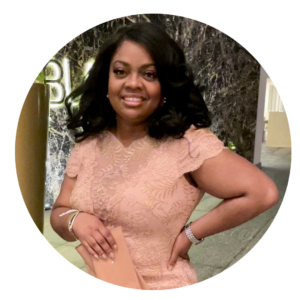February 17, 2023
Culture and Care: When Opportunity Calls
While challenging, acknowledging known disparities in clinical leadership and championing diversity are crucial to achieving the global goal of equitable outcomes for patients. We have a long way to go, and we must continue celebrating individuals and leaders who represent historically disenfranchised communities. Sharing stories of intersectionality, uniqueness, and triumph is one of the most important things we can do to recognize Black History Month and the ongoing contributions of the Black Community in medicine.
A Reflection by Nicole Sims, DO, Medical Director, Community Hospital of San Bernardino

Nicole Sims, DO
Leading in medicine as a woman is hard. As a black woman, it’s even harder.
Someone once told me, “Whatever your gift is, whatever talent you have, whatever is special about you— it will make room for you.” When I’m true to who I am, opportunities come my way. There are things about me I can’t change. I can’t change the fact that I’m a woman. I can’t change that I’m Black. But I can change how I view myself and see these truths as assets. Namely, these things can be a way for me to maneuver in spaces where others may not be able to make waves.
My journey to medicine was interesting. As a kid, I grew up in the hospital. My dad had sickle cell anemia, which kept him in the hospital for long stretches. My mother was a nurse at the same hospital, so much of my childhood was spent at the bedside with my father or with my mother when she needed to work. After a while, it felt like going to an aunt’s house. I remember the nurses stealing green Jell-O cups for me and my twin brother and falling asleep in the nurses’ offices. But during those long nights in the hospital, I never dreamed of being a doctor.
I felt at home in the hospital. Though it was hard, the nursing staff and my mother were very careful to make the experience positive for us. My brother and I were quite young, and they didn’t want us to see the scary part of medicine. We got familiar with the kindness of the nurses and the doctors and saw the humanity of medicine. My father worked in the lab at the hospital, so the whole staff knew him, his situation, and, eventually, his family.

Young Nicole and her family.
It was a very different experience, being at the bedside versus in the hospital bed. So often, people have lousy healthcare experiences that close their minds to the good that medicine can do. I’m grateful that wasn’t the case for me because it laid the foundation for my future in medicine. I’m in my 40s now, and I can still visit that hospital in Alabama and talk to the nurses I grew up around.
I was 8 years old when my father passed away. My mother moved us to California to be near family, and I went on to study biology in college. My list of dreams was long and unfocused. I wanted to teach, but I also wanted to be a Laker girl and dance. I only considered medicine once my mother encouraged me to shadow a family friend for spring break. Watching him work as a physician was the first time, I understood how powerful that position was. Seeing him communicate with his patients and make such an impact in their lives helped me fall in love with medicine.
By the time I became a clinician, I understood how personal touch is critical when delivering care. After COVID, medicine lost a lot of its humanity. It was a tragic time, and many doctors, myself included, were stressed every day.
When I started working for Sound, I worked hard. Too hard. At previous jobs, I was used to working in the hospital 22 to 28 days out of the month. The number of shifts I worked were unsustainable and my medical director knew that. He told me to slow down, afraid I’d get burned out, and didn’t let me sign up for shifts when he saw me taking on too many. I appreciated that so much because even though my work ethic was to his benefit, he saw that it was not beneficial for me.
I try to emulate that relatable human experience at the bedside. I tell my patients’ families, “I will treat your mom and your dad as if they were my mom and my dad,” because I saw providers treat my father as though he was theirs. I will give my patients grace because my leaders gave me grace when I didn’t even realize I needed it. Everything happens for a reason, and everything throughout my story got me to where I am.
Today, I still leave room for opportunities to emerge. As a natural problem solver, my current role as medical director at Sound is a great fit for me. I’m always looking for ways to solve problems and improve the care of my patients at the Community Hospital of San Bernardino. If you want to make an impact, approach life with an open mind. Be ready to educate and, most importantly, be true to who you are.
